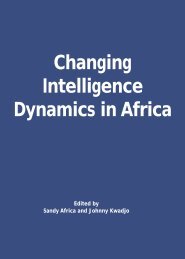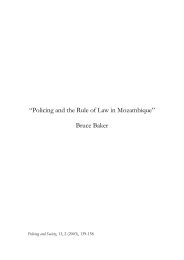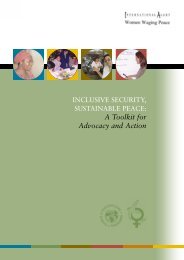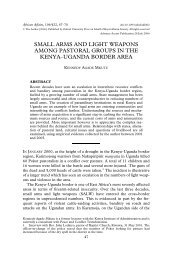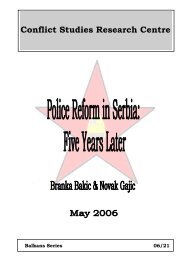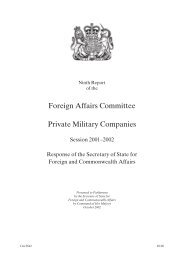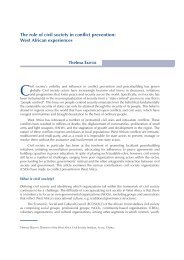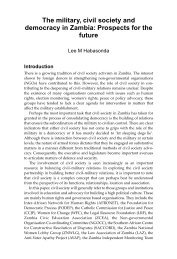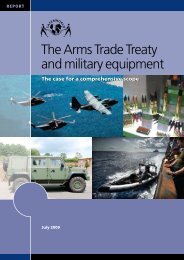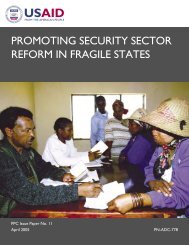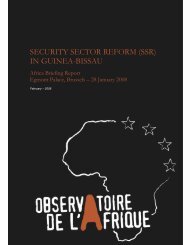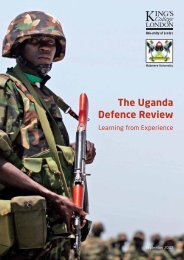AFGHANISTAN'S ELECTION CHALLENGES
AFGHANISTAN'S ELECTION CHALLENGES
AFGHANISTAN'S ELECTION CHALLENGES
Create successful ePaper yourself
Turn your PDF publications into a flip-book with our unique Google optimized e-Paper software.
Afghanistan’s Election Challenges<br />
Crisis Group Asia Report N°171, 24 June 2009 Page 21<br />
in power past the end of his term on 21 May partly<br />
because of the advantages of incumbency.<br />
The weakness of political parties and their organising<br />
capacity makes it is even more likely that state institutions,<br />
influence and resources will be mobilised during<br />
the election campaigns. IEC regulations require that:<br />
“No government department can contribute to the<br />
political campaign of a candidate or provide him/her<br />
with public resources unless equal conditions and facilities<br />
are considered for all candidates”. 150 It also puts<br />
the onus on candidates: “No person can use public<br />
resources for electoral campaigning unless similar<br />
conditions are provided to all candidates by the government”.<br />
151 But there is no specific penalty. A presidential<br />
decree also calls on officials to refrain from<br />
“direct or indirect influence” but likewise does not<br />
specify a penalty beyond stating that those who flout<br />
such instructions “shall be prosecuted according to<br />
the law”. 152<br />
The interior minister has stated that he has already<br />
issued such a decree, with 25 police officers receiving<br />
warnings by April. 153 Certainly far quicker action is<br />
required than prosecutions. Ministers must be seen to<br />
react quickly when bias among their staff or misuse of<br />
resources is alleged. A number of ministers and governors<br />
are also perceived as acting in an openly partisan<br />
way and the IEC needs to speak up strongly on<br />
this – with the ECC called in if necessary. Since interference<br />
and pressure on officials is to be expected,<br />
ensuring a transparent and accountable appointments<br />
process for government positions is all the more important<br />
over the electoral cycle. Given the significant<br />
funding provided by foreign donors, the international<br />
community needs to be wary of actions that will raise<br />
perceptions of partisanship both in Kabul and out in the<br />
regions where national troop contingents are present.<br />
Admittedly, development initiatives cannot stop for<br />
months during the elections, and providing equal facilities<br />
to candidates, such as access to air transport, will<br />
be difficult with such large ballots. However, every<br />
effort should be made to ensure that foreign funds and<br />
resources are not used in a manner which will be perceived<br />
as partisan.<br />
Although abuse of state resources is less likely to affect<br />
the provincial council and Wolesi Jirga elections, which<br />
have few authorities and resources, the Wolesi Jirga<br />
should issue clear guidelines, early in its 2010 term, on<br />
the use of offices, housing and official vehicles, as well<br />
as barring interference with the work of government<br />
or electoral officials.<br />
2. 28Campaign finance<br />
The Electoral Law bans “offering or receiving a payment<br />
or other benefit for the purpose of influencing<br />
the electoral process”, “use of funds originating from<br />
illegal activities” and “use of foreign funds for the<br />
purpose of influencing the electoral process”. 154 The<br />
Political Party Law similarly demands that “funds and<br />
expenses … shall be public and transparent” 155 with<br />
individual donations limited to 2 million Afghanis<br />
($400,000) a year. 156 In 2005, regulations barred<br />
Wolesi Jirga candidates from spending over $15,000<br />
on their campaigns and provincial council candidates<br />
over $7,500. But there was no specific mechanism to<br />
oversee such requirements, and the JEMB reportedly<br />
failed to examine the financial records of candidates.<br />
157 In a country awash with narcotics funding<br />
and where neighbouring countries seek to exert their<br />
influence, oversight is essential.<br />
While no spending limits have yet been declared, there<br />
do appear to be more specific financial requirements,<br />
at least for presidential aspirants, than previously. New<br />
IEC regulations demand candidates declare assets<br />
worth more than $20,000 158 and maintain a separate<br />
bank account for campaign finances. 159 Logs must be<br />
kept with the names of donors and more specific records<br />
of all donations and payouts of over $100. 160 All such<br />
records must then be submitted to the IEC within a<br />
month of election day 161 – which will then be published.<br />
The effectiveness of such rules lies in their<br />
enforcement, and sanctions are weak. Non-submission<br />
or incomplete financial reporting is declared an “electoral<br />
offence” but there is no punishment beyond a<br />
ban on standing for future elections until such time as<br />
150 Regulation of Political Campaign Finance Disclosure,<br />
IEC, 25 March 2009, Article 3.<br />
151 Ibid.<br />
152 “Non-Interference in the Election Affairs of the Year 2009”,<br />
presidential decree, 21 May 2009. It also requests “the UN<br />
representative office, other organs under its umbrella and<br />
the international community … to refrain from any interference<br />
which may hurt their impartialness prior to and during<br />
the vote”.<br />
153 11th JCMB, Summary of Proceedings, 19 April 2009, p.<br />
4.<br />
154 Article 53 of the Electoral Law (2005).<br />
155 Article 14 of the Political Parties Law (2005).<br />
156 Article 15 of the Political Parties Law (2005).<br />
157 David Ennis, “Analysis of the Electoral Legal Framework<br />
of Afghanistan”, IFES, 28 February 2006.<br />
158 Regulation of Political Campaign Finance Disclosure,<br />
IEC, 25 March 2009, Article 2.<br />
159 Ibid, Article 6.<br />
160 Ibid, Article 4.<br />
161 Ibid, Article 8 and 10.



